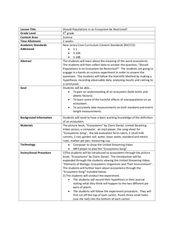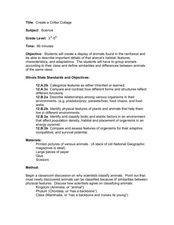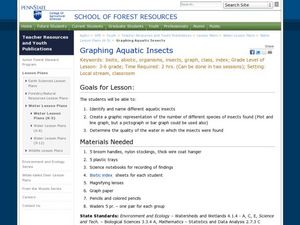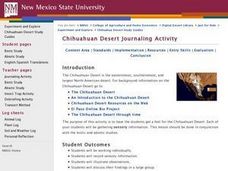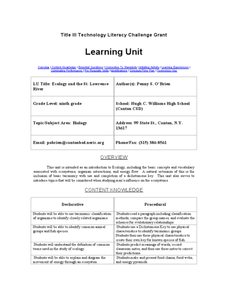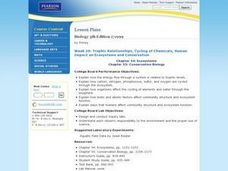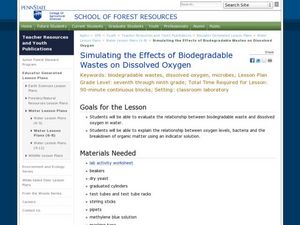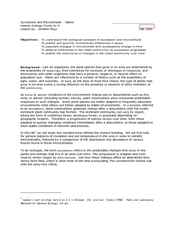Curated OER
Should Populations in an Ecosystem be Restricted?
Fourth graders experiment to determine how overpopulation effects ecosystems specifically plants. In this ecosystem lesson, 4th graders conduct an ecosystems experiment after listening to Claire Daniel's, Ecosystems. They watch a video,...
Curated OER
Animals and Plants of BC's Rocky Shore: lesson 3
Students create a mural of the food chain of the animals and plants of BC's rocky shore. In this food chain lesson plan, students also play a food chain matching game.
Curated OER
Savanna Hands-On Biome Building
Fifth graders participate in an interdisciplinary project related to the Savanna biome. In this biome building instructional activity, 5th graders display the elements of the Savanna biome such as the geography, animals and plants, and...
Curated OER
Biological Sciences
Students examine biodiversity and interrelatedness concepts. In this ecology lesson students go on a field trip and fill out a data sheet.
Curated OER
Create a Critter Collage
Students create a collage. In this animal classification lesson, students discuss why and how scientists classify animals. Students view pictures of different animals and decide which class each animal belongs to. Students compare...
Curated OER
Food Webs and Making Miniature Ecosystems
Students model a food web and create a miniature ecosystem. In this animal interactions lesson, students engage in a role playing game which simulates a food web. Students then build miniature ecosystems using pop bottles, snails, plants...
Curated OER
Graphing Aquatic Insects
Students identify aquatic insects. In this organism lesson, students locate aquatic insects near a local waterway and collect them. Students graph the amount of insects that they collected.
Curated OER
How We Impact the Earth
Young scholars work in cooperative learning groups to create PowerPoint or KeyNote presentations on how humans impact the earth. This lesson can be accomplished in three different parts.
Curated OER
Chihauhan Desert Journaling Activity
Students explore U.S. geography by completing an observational activity with classmates. In this New Mexico lesson, students research the Chihuahuan Desert by visiting several Internet sites. Students write the data they've collected in...
Curated OER
Biosphere
Young scholars examine the basic biosphere and its components. In this ecology lesson students complete several experiments including designing a system that is balanced to sustain life.
Curated OER
Some Similarities Between the Spread of an Infectious Disease and Population Growth
Students compare and contrast the spread of infectious diseases and population growth. In this biology instructional activity, students identify the exponential growth pattern of spreading diseases. They relate this to HIV infection and...
Curated OER
Ecology and the St. Lawrence River
Ninth graders complete a unit of lessons on ecosystems, organism interactions, and energy flow. They create a key for known species of fish, diagram the movement of energy through an ecosystem, and create and present food chains and food...
Curated OER
Trophic Relationships, Cycling of Chemicals, Human Impact on Ecosystems and Conservation
Students explore how the energy flow through a system is related to trophic levels. They investigate how organisms affect the cycling of elements and water through the biosphere. Students participate in lab activities to observe ways...
Curated OER
Simulating the Effects of Biodegradable Wastes on Dissolved Oxygen
Students evaluate the relationship between biodegradable waste and dissolved oxygen in water. In this biodegradable wastes lesson students complete a lab activity in groups then analyze their results.
Curated OER
What's in Our Woods?
Students observe their local forest and document the change that occurs over the school year. For this forestry lesson, students utilize a GPS to mark a certain area of the woods as their study area for the remainder of the year....
Curated OER
Our World A Complex Eco-system
Sixth graders set up an ecosystem, investigate conservation techniques, develop an action plan for conservation, and various other activities to explore the ecosystem.
Curated OER
Six Levels of Ecological Organization
Ninth graders describe the six levels of ecological organizations and give examples of each. They also differentiate between food chains and webs and identify trophic and consumer levels in food chain and food webs.
Curated OER
Outcomes Science 4: Earth & Beyond
In this earth and beyond science worksheet, students read through 11 pages of information on weather, global warming, climate change and other related topics. There are many website links on the pages that provide additional information...
Curated OER
Succession and Microclimate
Students compare the population of insects in different microclimates. In this biology activity, students collect data using probes to tabulate temperature and soil data. They predict how certain parameters change as an area goes through...
Curated OER
The Portable Niche
Third graders, in groups, research animals, plants, and conditions found in ecosystems.
Curated OER
Survivor
Seventh graders investigate changes in the ecosystem within the school year. They see that ecosystems, communities, populations, and organisms are dynamic and change over time. They, in groups, collect data in quadrants in the fall,...


